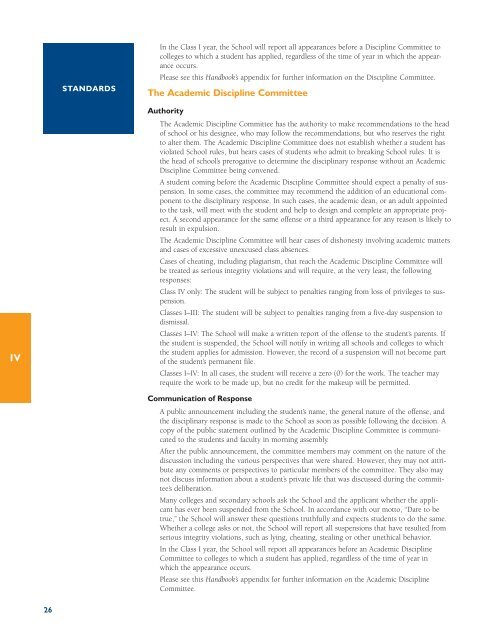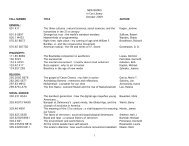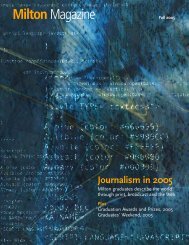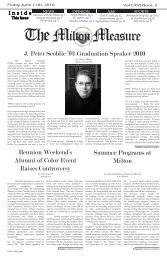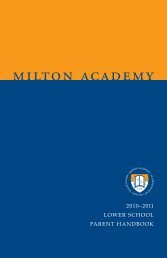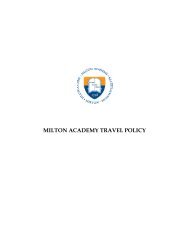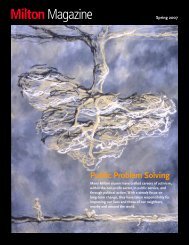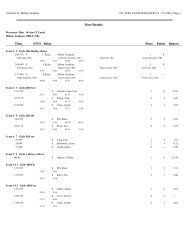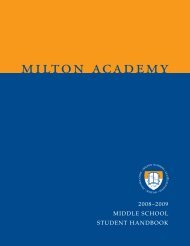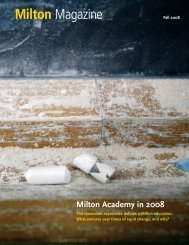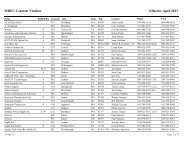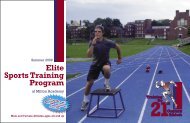Upper School Student Handbook 2013–2014 - Milton Academy
Upper School Student Handbook 2013–2014 - Milton Academy
Upper School Student Handbook 2013–2014 - Milton Academy
Create successful ePaper yourself
Turn your PDF publications into a flip-book with our unique Google optimized e-Paper software.
standards<br />
In the Class I year, the <strong>School</strong> will report all appearances before a Discipline Committee to<br />
colleges to which a student has applied, regardless of the time of year in which the appearance<br />
occurs.<br />
Please see this <strong>Handbook</strong>’s appendix for further information on the Discipline Committee.<br />
The Academic Discipline Committee<br />
IV<br />
Authority<br />
The Academic Discipline Committee has the authority to make recommendations to the head<br />
of school or his designee, who may follow the recommendations, but who reserves the right<br />
to alter them. The Academic Discipline Committee does not establish whether a student has<br />
violated <strong>School</strong> rules, but hears cases of students who admit to breaking <strong>School</strong> rules. It is<br />
the head of school’s prerogative to determine the disciplinary response without an Academic<br />
Discipline Committee being convened.<br />
A student coming before the Academic Discipline Committee should expect a penalty of suspension.<br />
In some cases, the committee may recommend the addition of an educational component<br />
to the disciplinary response. In such cases, the academic dean, or an adult appointed<br />
to the task, will meet with the student and help to design and complete an appropriate project.<br />
A second appearance for the same offense or a third appearance for any reason is likely to<br />
result in expulsion.<br />
The Academic Discipline Committee will hear cases of dishonesty involving academic matters<br />
and cases of excessive unexcused class absences.<br />
Cases of cheating, including plagiarism, that reach the Academic Discipline Committee will<br />
be treated as serious integrity violations and will require, at the very least, the following<br />
responses:<br />
Class IV only: The student will be subject to penalties ranging from loss of privileges to suspension.<br />
Classes I–III: The student will be subject to penalties ranging from a five-day suspension to<br />
dismissal.<br />
Classes I–IV: The <strong>School</strong> will make a written report of the offense to the student’s parents. If<br />
the student is suspended, the <strong>School</strong> will notify in writing all schools and colleges to which<br />
the student applies for admission. However, the record of a suspension will not become part<br />
of the student’s permanent file.<br />
Classes I–IV: In all cases, the student will receive a zero (0) for the work. The teacher may<br />
require the work to be made up, but no credit for the makeup will be permitted.<br />
Communication of Response<br />
A public announcement including the student’s name, the general nature of the offense, and<br />
the disciplinary response is made to the <strong>School</strong> as soon as possible following the decision. A<br />
copy of the public statement outlined by the Academic Discipline Committee is communicated<br />
to the students and faculty in morning assembly.<br />
After the public announcement, the committee members may comment on the nature of the<br />
discussion including the various perspectives that were shared. However, they may not attribute<br />
any comments or perspectives to particular members of the committee. They also may<br />
not discuss information about a student’s private life that was discussed during the committee’s<br />
deliberation.<br />
Many colleges and secondary schools ask the <strong>School</strong> and the applicant whether the applicant<br />
has ever been suspended from the <strong>School</strong>. In accordance with our motto, “Dare to be<br />
true,” the <strong>School</strong> will answer these questions truthfully and expects students to do the same.<br />
Whether a college asks or not, the <strong>School</strong> will report all suspensions that have resulted from<br />
serious integrity violations, such as lying, cheating, stealing or other unethical behavior.<br />
In the Class I year, the <strong>School</strong> will report all appearances before an Academic Discipline<br />
Committee to colleges to which a student has applied, regardless of the time of year in<br />
which the appearance occurs.<br />
Please see this <strong>Handbook</strong>’s appendix for further information on the Academic Discipline<br />
Committee.<br />
26


